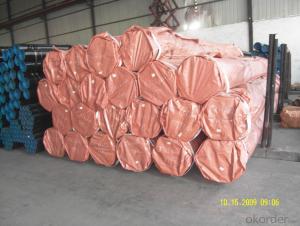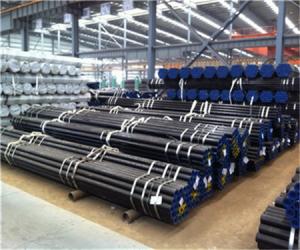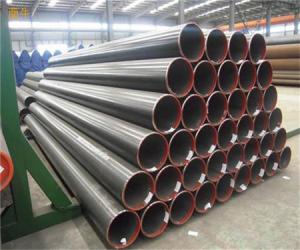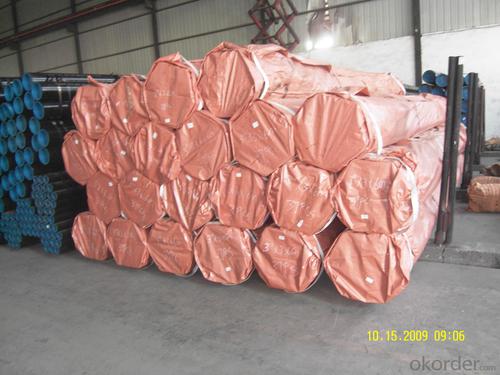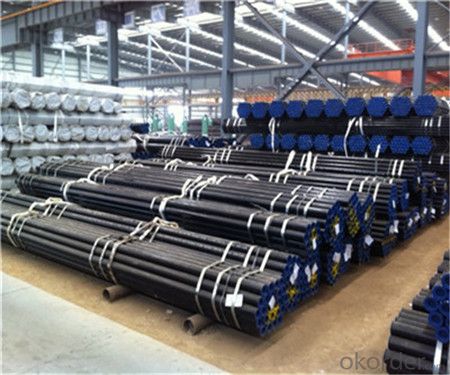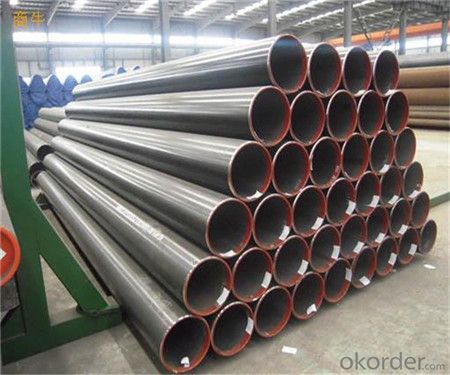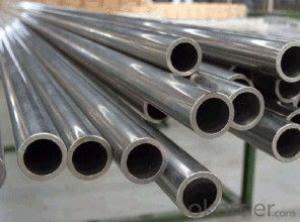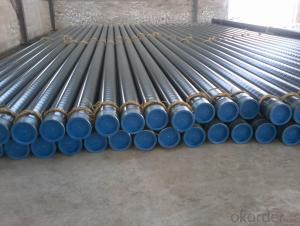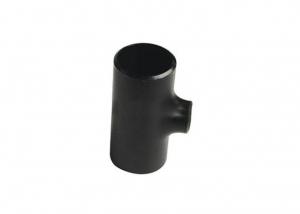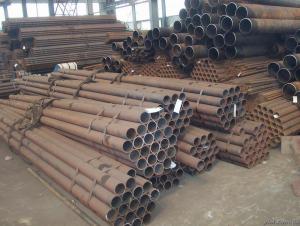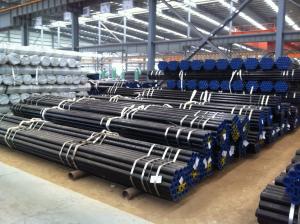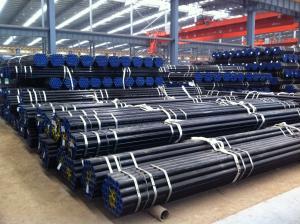Seamless Carbon Steel Pipe 24"
- Loading Port:
- China Main Port
- Payment Terms:
- TT or LC
- Min Order Qty:
- -
- Supply Capability:
- -
OKorder Service Pledge
OKorder Financial Service
You Might Also Like
1、Structure of Seamless Pipe:
Seamless pipe is formed by drawing a solid billet over a piercing rod to create the hollow shell. As the manufacturing process does not include any welding, seamless pipes are regarded as withstanding pressure better than other types, and was often more easily available than welded pipe.
2、Main Features of the Seamless Pipe :
• High manufacturing accuracy
• Small inertia resistance
• Strong heat dissipation ability
• Good visual effect
• Reasonable price
3、Seamless Pipe Specification:
Standard | GB, DIN, ASTM ASTM A106-2006, ASTM A53-2007 |
Grade | 10#-45#, 16Mn 10#, 20#, 45#, 16Mn |
Thickness | 8 - 33 mm |
Section Shape | Round |
Outer Diameter | 133 - 219 mm |
Place of Origin | Shandong, China (Mainland) |
Secondary Or Not | Non-secondary |
Application | Hydraulic Pipe |
Technique | Cold Drawn |
Certification | API |
Surface Treatment | factory state or painted black |
Special Pipe | API Pipe |
Alloy Or Not | Non-alloy |
Length | 5-12M |
Outer Diameter | 21.3-610mm |
Grade | 20#, 45#, Q345, API J55, API K55, API L80, API N80, API P110, A53B |
Standard | ASME, ASTM |
4、Packaging & Delivery
Packaging Details: | seaworthy package,bundles wrapped with strong steel strip |
Delivery Detail: | 15-30days after received 30%TT |
5、FAQ of Seamless Pipe :
①How is the quality of your products?
Our products are manufactured strictly according to national and internaional standard, and we take a test on every pipe before delivered out. If products’ quality don’t accord to discription as we give or the promise before you place order, we promise 100% refund.
②How about price?
We can give you lowest price , and we have a policy that “ for saving time and absolutely honest business attitude, we quote as lowest as possible for any customer, and discount can be given according to quantity”.Please trust the quotation we would give you, it is professional one.
③Why should you chose us?
We can give you both good quality and price.Besides, we can also provide professional products inquiry, products knowledge train(for agents), smooth goods delivery, exellent customer solution proposals.Our service formula: good quality+good price+good service=customer’s trust
6、Seamless Pipe Images:
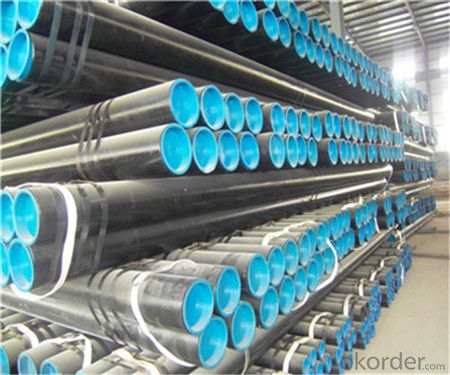
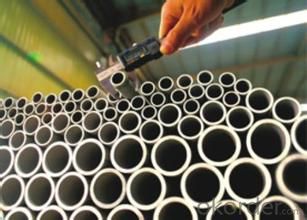
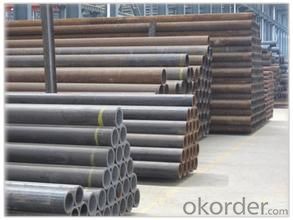
- Q: What is hot rolled steel pipe? What is a cold drawn steel tube?
- Seamless steel pipe, hot-rolled and cold-rolled (DIAL) seamless steel pipe two categories.Hot rolled steel tubes are divided into ordinary steel tubes, low and medium pressure boiler tubes, high pressure boiler tubes, alloy steel pipes, stainless steel pipes, oil cracking pipes, geological steel pipes and other steel pipes, etc..Cold rolled seamless steel pipe (DIAL) in general, steel pipe for low and medium pressure boiler tube, high-pressure boiler steel pipe, alloy steel pipe, stainless steel pipe, oil cracking tube and other steel tube, including carbon thin-walled steel, alloy thin-walled steel, stainless steel, thin steel tube. The outer diameter of hot-rolled seamless tube is generally greater than 32mm, the wall thickness is 2.5-75mm. The outer diameter of cold-rolled seamless steel tube can reach 6mm, the wall thickness can be up to 0.25mm, the outer diameter of thin-wall pipe can be 5mm, the wall thickness is less than 0.25mm, and cold rolling has higher precision than hot rolling dimension.
- Q: How do you repair damaged steel pipes?
- To fix steel pipes that have been damaged, there are several steps you can take: First, you need to determine the extent of the damage. Assess how severe it is to decide if you can repair it or if you need to replace the entire pipe. Next, isolate and drain the section that is damaged. Shut off the water supply to that part of the pipe and drain any remaining water to prevent further leaks or damage. After that, clean the damaged area by removing any dirt, rust, or debris. You can use a wire brush or sandpaper for this job. Then, prepare the damaged area by roughening the surface with coarse sandpaper. This will help the repair material adhere better to the pipe. Next, choose a repair method based on the size and location of the damage. There are different options available such as using epoxy putty, pipe wraps, or clamps. Once you've chosen a repair method, follow the instructions provided to apply the repair material to the damaged area. Make sure it covers the entire damaged section and extends slightly beyond it for added protection. After applying the repair material, allow it to cure according to the manufacturer's instructions. This will ensure a strong bond and effective sealing of the damaged area. Once the repair has cured, turn the water supply back on and check for any leaks. If there are no signs of leakage, then the repair has been successful. If there are still leaks, you may need to reconsider the repair or seek professional help. Keep in mind that these steps are a general guideline for repairing damaged steel pipes. The specific repair method may vary depending on the size and severity of the damage. In more complex cases or if you're unsure, it's best to consult a professional plumber or pipe repair specialist.
- Q: Can steel pipes be used for geothermal heating systems?
- Yes, steel pipes can be used for geothermal heating systems. Steel pipes are commonly used for their durability and ability to withstand high temperatures and pressures. They are suitable for transferring geothermal heat from the ground to the heating system within a building. However, it is important to consider the specific requirements of the geothermal system and consult with professionals to ensure proper installation and compatibility with the system components.
- Q: What are the common methods for joining steel pipes?
- Different methods exist for joining steel pipes, depending on specific applications and requirements. Some commonly employed techniques include the following: 1. Welding: Among the most frequently used methods to join steel pipes, welding involves heating the pipe ends and applying pressure to fuse them. Various techniques can be employed, such as arc welding, MIG welding, TIG welding, and even laser welding. 2. Threaded connections: This method involves threading the ends of steel pipes to create male and female connections. These threaded ends are then screwed together using pipe threads. Threaded connections are typically utilized for smaller diameter pipes and in low-pressure applications. 3. Flanged connections: Flanges are employed to join steel pipes in situations that necessitate easy assembly and disassembly or frequent maintenance. Flanges are flat, circular discs with bolt holes that allow for the bolting of pipes together. They offer a robust and leak-proof connection. 4. Compression fittings: Compression fittings enable the joining of steel pipes without the need for welding or threading. They consist of a compression nut, compression ring, and compression sleeve. The nut is tightened onto the sleeve, compressing it against the pipe and creating a secure connection. 5. Grooved couplings: Mechanical connections are created with grooved couplings, which are utilized to join steel pipes. The pipe ends are grooved, and a gasket is inserted between the grooves. The couplings are then tightened, compressing the gasket and forming a tight seal. 6. Soldering or brazing: These methods involve the use of filler metal with a lower melting point than the steel pipes. The filler metal is heated and melted, allowing it to flow between the pipe joints and create a bond. Soldering is generally suited for smaller diameter pipes and low-pressure applications. Each joining method has its own advantages and limitations. The appropriate method for joining steel pipes depends on factors such as pipe diameter, application, working pressure, and required joint durability. It is crucial to consider these factors and consult industry standards and guidelines when selecting the suitable joining method for steel pipes.
- Q: Theoretical weight of 25*25*1.5 square steel tubes
- Square steel tube, referred to as square tube, also known as square tube, is a square pipe of a kind of name, that is, the length of the same steel pipe. The strip is rolled by process. Generally, the strip is disassembled, leveled, crimped and welded to form a round tube. The tube is then rolled into square tubes and cut to the required length, usually 50 pieces per package.
- Q: What are the common standards for steel pipe manufacturing?
- There are several common standards for steel pipe manufacturing that ensure the quality and consistency of the products. One of the most widely recognized standards is the American Society for Testing and Materials (ASTM) standard, which includes various specifications for different types of steel pipes. These specifications cover dimensions, mechanical properties, and testing requirements. Another common standard is the American National Standards Institute (ANSI) standard, which establishes guidelines for the manufacturing process, material requirements, and performance characteristics of steel pipes. ANSI standards are often used in industrial applications and construction projects. In addition to these, there are international standards such as the International Organization for Standardization (ISO) standard, which provides guidelines for the design, production, and testing of steel pipes. The ISO standard ensures that steel pipes meet global quality and safety standards. Furthermore, specific industries may have their own standards for steel pipe manufacturing. For example, the American Petroleum Institute (API) has developed standards specifically for oil and gas industry applications. These standards, such as API 5L, outline requirements for the manufacturing, testing, and inspection of steel pipes used in the transportation of oil and gas. Overall, these common standards for steel pipe manufacturing help to ensure the quality, reliability, and safety of the products. They provide a standardized framework that manufacturers can follow, enabling customers to have confidence in the performance and durability of the steel pipes they purchase.
- Q: What are the safety measures to consider when working with steel pipes?
- When working with steel pipes, it is important to follow specific safety measures to ensure a safe working environment. Some key safety measures to consider include wearing appropriate personal protective equipment (PPE) such as gloves, safety glasses, and steel-toed boots to protect against potential injuries. Additionally, workers should be cautious of sharp edges and use tools designed for cutting and handling steel pipes. It is crucial to secure pipes properly to prevent accidents caused by falling or rolling pipes. Lastly, workers should be trained on proper lifting techniques to avoid strain or injury when handling heavy steel pipes.
- Q: How are steel pipes used in the manufacturing of food and beverage processing plants?
- Steel pipes are commonly used in food and beverage processing plants for various purposes such as transporting liquids, gases, and steam. They are used to create a network of pipelines that facilitate the movement of raw materials, ingredients, and finished products throughout the manufacturing process. Steel pipes are chosen for their durability, corrosion resistance, and ability to withstand high pressure and temperature conditions, ensuring the safety and efficiency of food and beverage production.
- Q: How do you calculate the pipe flow velocity for steel pipes?
- To calculate the pipe flow velocity for steel pipes, you can use the Manning's formula or the Darcy-Weisbach equation. 1. Manning's formula: This formula is commonly used for open channel flow but can also be applied to partially filled pipes. It calculates the velocity based on the pipe's hydraulic radius, slope, and Manning's roughness coefficient. The formula is as follows: Velocity (V) = (1.486/n) * (R^2/3) * (S^1/2) Where: - V is the velocity - n is the Manning's roughness coefficient (which can be obtained from reference tables) - R is the hydraulic radius (cross-sectional area divided by wetted perimeter) - S is the slope of the energy grade line 2. Darcy-Weisbach equation: This equation is widely used for pipe flow calculations and is based on the principle of energy conservation. It calculates the velocity based on the pipe's diameter, roughness coefficient, and the head loss due to friction. The formula is as follows: Velocity (V) = (2 * g * hL)^0.5 Where: - V is the velocity - g is the acceleration due to gravity (approximately 9.81 m/s^2) - hL is the head loss due to friction, which can be calculated using the Darcy-Weisbach equation: hL = (f * L * V^2) / (2 * g * D) Where: - f is the Darcy friction factor (which depends on the Reynolds number and pipe roughness) - L is the length of the pipe - D is the diameter of the pipe Both formulas require some input parameters such as pipe dimensions, roughness coefficients, and slope. These parameters can be obtained from engineering references or pipe manufacturer specifications. It is important to note that these formulas provide approximate values and may require iterations or adjustments for accurate results.
- Q: Are steel pipes suitable for industrial applications?
- Yes, steel pipes are highly suitable for industrial applications. Steel pipes possess excellent strength, durability, and corrosion resistance, making them ideal for transporting fluids, gases, and solid materials in various industries such as oil and gas, construction, automotive, and manufacturing. Additionally, steel pipes can withstand high pressure, extreme temperatures, and harsh environmental conditions, making them reliable and efficient for industrial operations.
Send your message to us
Seamless Carbon Steel Pipe 24"
- Loading Port:
- China Main Port
- Payment Terms:
- TT or LC
- Min Order Qty:
- -
- Supply Capability:
- -
OKorder Service Pledge
OKorder Financial Service
Similar products
Hot products
Hot Searches
Related keywords
